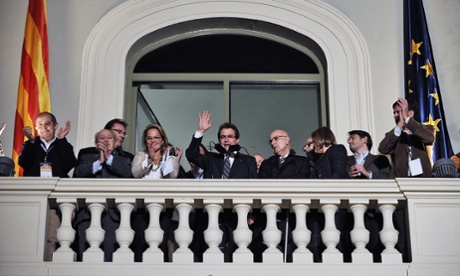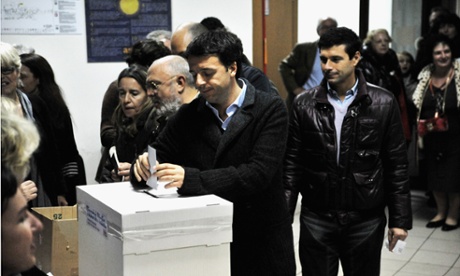http://hat4uk.wordpress.com/2012/11/26/greece-breaking-new-poll-puts-left-in-the-lead-far-right-twice-the-size-of-pasok/
GREECE BREAKING: New poll puts Left in the lead, far Right twice the size of PASOK
The social engineering skills of the EU were on full display this evening as the latest Greek opinion poll showed Alexis Tripras’s Syriza Party clearly in the lead, with fully one in eight respondents proposing to vote for the Greek Nazis, Golden Dawn. Both Parties appear to have gained from a loss of support for the Democratic Left.
The topline breakdown is as follows:
23.5% SYRIZA (Alexis Tsipras)
19% Nea Dimocratia (Antonis Samaras)
12% Chrysi Avgi (Golden Dawn)
6.5% Independent Greeks (ANEL)
6% PASOK (Evangelos Veryfatperson)
5% KKE
3.5% Democratic Left. (DIMAR)
Thus the man negotiating with Berlin-am-Brussels lacks the support of 4 in 5 Greeks, and his deputy Coalition partner is hated by 94% of Greeks. So it’s not exactly a rousing vote of support for Herman and Angela. As revealed here recently, if he swerves slightly to the Right and then tempts the Venizelos dregs across to his Europe Party, Samaras might just edge into the lead. Whethere he could stop Golden Dawn from invading Albania is another story.
Reactions ......
http://www.zerohedge.com/news/2012-11-26/mark-grant-greece-there-no-deal-here
Mark Grant On Greece: "There Is No Deal Here"
Submitted by Tyler Durden on 11/26/2012 20:45 -0500
Via Mark J. Grant, author of Out of the Box,
There is no deal here. There is a fantasy of projections and some wishful thinking but no deal. There is not even an agreement on disbursement as codified in the last paragraph of the statement (here). The odds on Greece reaching a primary surplus in the next several years are about 1 degree off of Kelvin's Absolute Zero [the market seems to agree]
The deferral of interest payments and the extension of the loans have some meaning but are nowhere close to bridging the deficit gap.
All of this of course has to go back to the nations' Parliaments and it may not be as readily accepted as some hope.
There is not even a definitive agreement yet to give Greece more money.
The debt buy-back (as we discussed here) is governed under British law and while they are once again going after the private sector bondholders there is no CAC to enforce any action though there is the obvious falsification of prior claims that "it will never happen again."
What we have here are more promises, a concocted ruse and an agreement on a concept that is actually no deal at all.
I would also say that Mr. Draghi lost a good deal of credibility tonight touting this statement as an agreement that would "reduce uncertainty."
Ms. Lagarde's statement:
“The initiatives include Greek debt buybacks, return of Securities Market Programme (SMP) profits to Greece, reduction of Greek Loan Facility (GLF) interest rates, significant extension of GLF and European Financial Stability Facility (EFSF) maturities, and the deferral of EFSF interest rate payments."
is also factually incorrect as these are "maybe" proposals for the most part as stated in the EU official pronouncement.
What we have here is one more "huff and puff" and no agreement by any definition that I would find acceptable.
http://www.guardian.co.uk/business/2012/nov/27/eu-imf-greek-debt
EU and IMF agree tentative deal to cut Greek debt
Agreement should see release of up to €44bn in bailout funds needed to rescue Athens from insolvency

European Central Bank president Mario Draghi arrives at the EU headquarters in Brussels prior to a meeting about the eurozone crisisl Photograph: Georges Gobet/AFP/Getty Images
European governments and the IMF sought to bury months of feuding over Greek debt levels in a tentative agreement that should see the release of up to €44bn in bailout funds needed to rescue Athens from insolvency.
But after almost 12 hours of talks for the third time in a fortnight between eurozone finance ministers, leaders of the IMF, the European central bank and the European commission struggled to reach a consensus, suggesting a lack of confidence that the effort to resurrect the Greek economy will bear fruit or that three years of European bailout policy was working.
The meeting agreed to shave projected Greek debt to allow it to level at 124% of GDP by 2020, entailing a 20% cut in Greek debt by the deadline.
With the IMF demanding a writedown of Greece's debt by its official eurozone creditors and Germany leading the resistance to such a move, declaring it illegal, the meeting agreed on a mixture of measures involving debt buybacks, lower interest rates on loans, longer maturity periods on borrowing, and ECB returns to Greece of profits on its holdings of Greek bonds.
In an increasingly arcane dispute entailing sophisticated number-crunching over recent weeks, the IMF had stuck to a bottom line of getting the Greek debt level to 120% by 2020, far below what eurozone and IMF inspectors concluded was possible.
A debt sustainability analysis last week said the debt level would be 144% without eurozone action to write much of it off.
The Europeans hoped to extend the IMF-set 2020 deadline for debt "sustainability" by two years, but Christine Lagarde, the IMF chief, stuck to the 2020 date.
While Berlin played for more time, until after next year's general election and the expiry of Greece's formal bailout schedule in 2014, the IMF has been demanding a clear, credible longer-term programme.
Greece met the terms for the bailout funds a couple of weeks ago, agreeing a budget and swingeing spending cuts. Eurozone loans of at least €31.5bn have been pending since last summer, but held up recently by arguments not between Athens and its creditors, but by disputes among the creditors.
Greece, where the eurozone's debt crisis erupted in late 2009, is the currency area's most heavily indebted country, despite a big "haircut" this year on privately-held bonds. Its economy has shrunk by nearly 25 percent in five years.
The key question remains whether Greek debt can become sustainable without eurozone governments having to write off some of the loans they have made to Athens.
A source familiar with IMF thinking said the global lender was demanding immediate measures to cut Greece's debt by 20 percentage points of GDP, with a commitment to do more to reduce the debt stock in a few years if Greece fulfils its programme.
To reduce the debt to 124% by 2020, the ministers were putting together a package of steps including a debt buyback funded by a eurozone rescue fund, reducing the interest rate on loans and returning eurozone central bank 'profits' back to Greece.
Germany and its northern European allies have so far rejected any idea of forgiving official loans to Athens.
German finance minister Wolfgang Schäuble told reporters that a debt cut was legally impossible if it was linked to a new guarantee of loans.
"You cannot guarantee something if you're cutting debt at the same time," he said.
http://www.imf.org/external/np/sec/pr/2012/pr12458.htm
( Hmm , my read of Lagarde's last paragraph indicates a detailed and specific plan still has not been reached and the Troika is still flailing away... Note what Lagarde says in the closing paragraph “Once progress has been made on specifying and delivering on the commitments made today, in particular implementation of the debt buybacks, I would be in a position to recommend to the IMF Executive Board the completion of the first review of Greece’s program.” )
Statement on Greece by IMF Managing Director Christine Lagarde
Press Release No. 12/458
November 26, 2012
Ms. Christine Lagarde, Managing Director of the International Monetary Fund (IMF), made the following statement at the conclusion of the Eurogroup meeting in Brussels today:
“I welcome the initiatives agreed today by the Eurogroup aimed at further supporting Greece’s economic reform program and making a substantial contribution to the sustainability of its debt. This builds on the significant efforts by the Greek government to carry forward its fiscal and structural reform agenda.
“The initiatives include Greek debt buybacks, return of Securities Market Programme (SMP) profits to Greece, reduction of Greek Loan Facility (GLF) interest rates, significant extension of GLF and European Financial Stability Facility (EFSF) maturities, and the deferral of EFSF interest rate payments.
“Taken together, these measures will help to bring back Greece’s debt ratio to a sustainable path and facilitate a gradual return to market financing. The debt ratio is expected to decrease to 124 percent of GDP by 2020 through significant upfront debt reduction measures of 20 percent of GDP. In addition, I welcome the commitment by European partners to bring back Greece's debt to substantially below 110 percent of GDP by 2022, conditional on full implementation of the program by Greece. This represents a major debt reduction for Greece relative to its current debt trajectory.
“Once progress has been made on specifying and delivering on the commitments made today, in particular implementation of the debt buybacks, I would be in a position to recommend to the IMF Executive Board the completion of the first review of Greece’s program.”
http://www.guardian.co.uk/business/2012/nov/26/eurozone-crisis-greece-aid-eurogroup-meeting
( Here goes the manure-fest from Europe on Greece - The Guardian liveblog version.... )
The final question was taken by Juncker, who was asked what made him so positive that the GDP of Greece would be as calculated.
He replied:
We do strongly believe in the Greek capacity to recover. Greek people are courageous people. They are willing to bring their country back on the path of growth.We are agreeing amongst ourselves that in the next current mid terms financial review, more financial means will be dedicated to Greece.
Two final points from the eurogroup statement:
• Greece will get 44bn euros of aid under the plan, but the funding will be unlocked in three stages -- with payments linked to performance targets
• The The Eurogroup expects to formally decide on the disbursement by 13 December, subject to national parliaments giving their approval, where necessary.
As usual there has been plenty of praise for Greece's sacrifices.
Olli Rehn, who was discussing the deal alongside other key players (including Jean-Claude Juncker and Lagarde) at the press conference in Brussels said Greece had met its obligations, so it was vital that the eurogroup had not failed.
Juncker said the political agreement hammered out in Brussels was "not just about money" but would mean a "better future for Greece as a whole"
In a nutshell, says Graeme, the plan is designed to put Greece on a path to debt sustainability again.
As reported earlier, Athens must cut its debt to 124% of GDP by 2020 (not 120% as previously), and then to substantially lower than 110% in 2022.
Eurozone countries have agreed four key points:
• A lowering by 100 bps of the interest rate charged to Greece on the loans provided in the context of the Greek Loan Facility. Member States under a full financial assistance programme are not required to participate in the lowering of the GLF interest rates for the period in which they receive themselves financial assistance.
• A lowering by 10 bps of the guarantee fee costs paid by Greece on the EFSF loans.
• An extension of the maturities of the bilateral and EFSF loans by 15 years and a deferral of interest payments of Greece on EFSF loans by 10 years. These measures will not affect the creditworthiness of EFSF, which is fully backed by the guarantees from Member States.
• A commitment by Member States to pass on to Greece's segregated account, an amount equivalent to the income on the SMP portfolio accruing to their national central bank as from budget year 2013. Member States under a full financial assistance programme are not required to participate in this scheme for the period in which they receive themselves financial assistance.
A statement has been issued by the IMF welcomes Eurogroup agreement to support the Greek reform program.
In it, Lagarde says that the initiatives agreed today by the Eurogroup include Greek debt buybacks, return of Securities Market Programme (SMP) profits to Greece, reduction of Greek Loan Facility (GLF) interest rates, significant extension of GLF and European Financial Stability Facility (EFSF) maturities, and the deferral of EFSF interest rate payments.
She adds:
Taken together, these measures will help to bring back Greece’s debt ratio to a sustainable path and facilitate a gradual return to market financing.
She described the commitment by negotiators to bring back Greece's debt to substantially below 110 percent of GDP by 2022 as "a major debt reduction for Greece relative to its current debt trajectory".
The press conference is under way, with IMF chief Christine Lagarde telling bleary-eyed hacks that Greece had to be back in a sustainable path.
"I can tell you tonight that this has been achieved," she says.
Meanwhile, Peter Spiegel of the Financial Times isn't convinced that the eurogroup has made a major breakthrough:
As we wait for the press conference in Brussels, Graeme Wearden (who should be relaxing at home) points out that there are three key questions about any deal:
1. What are Greece's new bailout targets? Leaked documents have show that the old one -debt of 120% of GDP by 2020, was unachievable without significant debt relief.
2. Does Greece get its aid tranche, and how much? Originally Athens was to receive 31.5bn, but the delays means other payments are now due - so the total package could be 44bn
3. Who pays? Will the ECB give up some 'profits' on its Greek bonds. Will lenders accept lower interest rates. Is an official haircut on Greek bonds held by euro governments and central banks still off the table?
At the very least some sort of Eurogroup press conference is being touted up for livestreaming here tonight.
A note of caution on that deal. There are some doubts about what, if anything, has been agreed. The Zero Hedge site tweets:
However, discussions are continuing on details of the measures to reduce Athens' debt burden, says Reuters, which notes that the euro strengthened slightly against the dollar after news of a deal emerged.
Here's a quote to the agency from an unnamed offical:
It's going very slow, but we have financing and a Debt Sustainability Analysis. We've filled the financing gap until the end of program in 2014.
Officials have confirmed that the agreement on a new debt target for Greece following talks involving Eurozone finance ministers and the International Monetary Fund has been clinched, reports Reuters.
The news agency adds:
After nearly 10 hours of wrangling at their third meeting on the issue in as many weeks, Greece's international lenders agreed to reduce Greek debt by 40 billion euros to 124 percent of gross domestic product by 2020 through a package of steps.The deal opens the way for a major aid installment needed to recapitalize Greece's teetering banks and enable the government to pay wages, pensions and suppliers in December.
This is Ben Quinn picking up the blog now.
Updated
Reports of a breakthrough
Finally, sighs of white smoke in Brussels, with several reports that the
eurogroup and the IMF have reached some kind of deal over Greece's debt programme.
eurogroup and the IMF have reached some kind of deal over Greece's debt programme.
Full details aren't available yet, but apparently the new measures agreed
between euro finance ministers and the IMF would see Greek's debt pile drop to 124% of GDP by 2020.
between euro finance ministers and the IMF would see Greek's debt pile drop to 124% of GDP by 2020.
That's above the 120% target which the IMF had previously been sticking
too - suggesting it has given some ground.
too - suggesting it has given some ground.
It's also not clear if this is enough to unlock all the aid Greece is
waiting for (up to a maximum of 44bn euros).
waiting for (up to a maximum of 44bn euros).
But it looks like the long-awaited breakthrough ...
http://www.zerohedge.com/news/2012-11-26/we-have-new-new-new-greek-deal-full-details-and-live-webcast
We Have A New New New Greek Deal - Full Details And Live Webcast
Submitted by Tyler Durden on 11/26/2012 19:46 -0500
The words commitment, support, hard-work, and reform are popular among these talking heads. Here are the details and the press conference - though do NOT try and use your calculator.
The initiatives include Greek debt buybacks, return of Securities Market Programme (SMP) profits to Greece, reduction of Greek Loan Facility (GLF) interest rates, significant extension of GLF and European Financial Stability Facility (EFSF) maturities, and the deferral of EFSF interest rate payments.
* * *
* * *
27 November 2012 Eurogroup statement on Greece
The Eurogroup recalls that a full staff-level agreement has been reached between Greece and the Troika on updated programme conditionality and that, according to the Troika, Greece has implemented all agreed prior actions.
The Eurogroup in particular welcomes the updated assessment of the Troika that Greece has implemented in a satisfactory manner a wide ranging set of reforms, as well as the budget for 2013 and an ambitious medium term fiscal strategy 2013-16.
The Eurogroup noted with satisfaction that the updated programme conditionality includes the adoption by Greece of new instruments to enhance the implementation of the programme, notably by means of correction mechanisms to safeguard the achievement of both fiscal and privatisation targets, and by stronger budgeting and monitoring rules. Greece has also significantly strengthened the segregated account for debt servicing. Greece will transfer all privatizations revenues, the targeted primary surpluses as well as 30% of the excess primary surplus to this account, to meet debt service payment on a quarterly forward-looking basis. Greece will also increase transparency and provide full ex ante and ex post information to the EFSF/ESM on transactions on the segregated account.
The Eurogroup again commended the authorities for their demonstrated strong commitment to the adjustment programme and reiterated its appreciation for the efforts made by the Greek citizens. The Eurogroup noted that the outlook for the sustainability of Greek government debt has worsened compared to March 2012 when the second programme was concluded, mainly on account of a deteriorated macro-economic situation and delays in programme implementation The Eurogroup considered that the necessary revision in the fiscal targets and the implied postponement of a primary surplus target of 4.5% of GDP from 2014 to 2016 calls for a broader concept of debt sustainability encompassing lower debt levels in the medium term, smoothing of the current financing hump after 2020 and easing of its financing.
The Eurogroup was informed that Greece is considering certain debt reduction measures in the near future, which may involve public debt tender purchases of the various categories of sovereign obligations. If this is the route chosen, any tender or exchange prices are expected to be no higher than those at the close on Friday, 23 November 2012.
The Eurogroup considers that, in recapitalising Greek banks, liability management exercises should be conducted in respect of remaining subordinated debt holders so as to ensure a fair burden sharing.
Against this background and after having been reassured of the authorities' resolve to carry the fiscal and structural reform momentum forward and with a positive outcome of the possible debt buy-back operation, the euro area Member States would be prepared to consider the following initiatives:
A lowering by 100 bps of the interest rate charged to Greece on the loans provided in the context of the Greek Loan Facility. Member States under a full financial assistance programme are not required to participate in the lowering of the GLF interest rates for the period in which they receive themselves financial assistance.
- A lowering by 10 bps of the guarantee fee costs paid by Greece on the EFSF loans.
- An extension of the maturities of the bilateral and EFSF loans by 15 years and a deferral of interest payments of Greece on EFSF loans by 10 years. These measures will not affect the creditworthiness of EFSF, which is fully backed by the guarantees from Member States.
- A commitment by Member States to pass on to Greece's segregated account, an amount equivalent to the income on the SMP portfolio accruing to their national central bank as from budget year 2013. Member States under a full financial assistance programme are not required to participate in this scheme for the period in which they receive themselves financial assistance.
The Eurogroup stresses, however, that the above-mentioned benefits of initiatives by euro area Member States would accrue to Greece in a phased manner and conditional upon a strong implementation by the country of the agreed reform measures in the programme period as well as in the post-programme surveillance period.
The Eurogroup is confident that, jointly, the above-mentioned initiatives by Greece and the other euro area Member States would bring Greece's public debt back on a sustainable path throughout this and the next decade and will facilitate a gradual return to market financing. Euro area Member States will consider further measures and assistance, including inter alia lower co-financing in structural funds and/or further interest rate reduction of the Greek Loan Facility, if necessary, for achieving a further credible and sustainable reduction of Greek debt-to-GDP ratio, when Greece reaches an annual primary surplus, as envisaged in the current MoU, conditional on full implementation of all conditions contained in the programme, in order to ensure that by the end of the IMF programme in 2016, Greece can reach a debt-to-GDP ratio in that year of 175% and in 2020 of 124% of GDP, and in 2022 a debt-to-GDP ratio substantially lower than 110%. As was stated by the Eurogroup on 21 February 2012, we are committed to providing adequate support to Greece during the life of the programme and beyond until it has regained market access, provided that Greece fully complies with the requirements and objectives of the adjustment programme.
The Eurogroup concludes that the necessary elements are now in place for Member States to launch the relevant national procedures required for the approval of the next EFSF disbursement, which amounts to EUR 43.7 bn. EUR 10.6 bn for budgetary financing and EUR 23.8 bn in EFSF bonds earmarked for bank recapitalisation will be paid out in December. The disbursement of the remaining amount will be made in three sub-tranches during the first quarter of 2013, linked to the implementation of the MoU milestones (including the implementation of the agreed tax reform by January) to be agreed by the Troika.The Eurogroup expects to be in a position to formally decide on the disbursement by 13 December, subject to the completion of these national procedures and following a review of the outcome of a possible debt buy-back operation by Greece.
and...
http://www.zerohedge.com/news/2012-11-26/false-alarm-no-deal-yet-after-all-circus-known-europe-live-webcast-follow
False Alarm: No Deal Yet - This Is After All The Circus Known As Europe - Live Webcast
Submitted by Tyler Durden on 11/26/2012 17:48 -0500
Sure enough, it seems, the much aggrandized statement was merely more undecided 'leaked' actionless garbage from the EU's leaders:
- *EU OFFICIALS SAY UNCLEAR HOW LONG EUROGROUP GREEK TALKS TO LAST
- *EUROGROUP DISCUSSIONS OF GREEK AID STILL ONGOING, OFFICIALS SAY
EURUSD slumped immediately on this new news. The Eurogroup has set up the live webcast access point - below - though start times are 'estimated'.
http://www.zerohedge.com/news/2012-11-26/greece-saved-again-eurozone-and-imf-reach-deal-greek-debtgdp-124-2020
Greece Is Saved, Again, As Eurozone And IMF Reach Deal On Greek Debt/GDP of 124% By 2020
Submitted by Tyler Durden on 11/26/2012 17:13 -0500
No 4:00 AM morning session this time, as the general revulsion to even pretending to work on behalf of a totally destroyed country is tangible:
- EURO ZONE MINISTERS, IMF REACH DEAL TO CUT GREEK DEBT TO 124 PCT/GDP IN 2020 THROUGH PACKAGE OF EXTRA STEPS TOTALLING 20 PCT/GDP -OFFICIAL
Phew - great, Greece is fixed or something. The only problem, of course, as we explained earlier, is that Greece has to magically grow its GDP by EUR 50 billion from EUR 184 billion to EUR235 billion by 2020 for this 124% debt/GDP to be hit (and another EUR 20 billion in the next two years). No, really.
http://www.zerohedge.com/news/2012-11-26/farcical-tragicomedy-sustainable-greek-debtgdp-denominator
The Farcical Tragicomedy Of The "Sustainable" Greek Debt/GDP "Denominator"
Submitted by Tyler Durden on 11/26/2012 08:31 -0500
- Borrowing Costs
- Budget Deficit
- fixed
- Germany
- Greece
- Gross Domestic Product
- International Monetary Fund
- Nominal GDP
Somewhere in the deep bowels of Brussels bureaucratic labyrinth, a murder of European ministers (as they most closely approximate the Corvus Corvidae Genus/Species) currently sitting down and trying to come with a solution that "fixed" Greece. It will do no such thing: in fact, all that the Eurogroup is doing today, in addition to trying to do with it already did twice before without success, is to find a socially palatable way to disclose a policy that will see Greek debt haircut by a very modest amount ("unmodest" enough to be considered prohibited under Article 123, but who is counting any more), either through an outright haircut of official sector debt (something Germany has repeatedly said "9" to), or through a debt buyback of existing private debt (something which will have no impact now that the debt has soared following a long-running political leak which has allowed bondholders to trade accordingly). Aside for applying lipstick on a dead pig, what Europe is doing is focusing on the numerator in the all critical debt/GDP ratio. Sadly, this is just half of what Europe should be focusing on. The other half? Why GDP of course. Because it is here that things get truly hilarious.
As can be seen in the tables below which summarize the projections for the Greek economy, either with or without policy implementation that sees a debt cut, is that the country will halt that collapse in its GDP (which dropped more than 7% in the last quarter) and not only post its first rise in 2014, but grow by 3.9% in 2015, and over 4% each year after. Just as laughable a scenario face the Greek primary surplus: the country, where striking people go on strike from striking to really emphasize their point, and in which virtually no tax revenues are being created, is expected to see its budget deficit flatline in 2013 and somehow rise to a surplus well over 4% of GDP each year. Laughable? yes. Idiotic? Absolutely. Because if Greece achieves this, it will be the first country to have not only grown its GDP, but achieved a primary surplus in a time of deleveraging, because under Keynesian voodoo rules, a country's GDP can only grow if its debt grows in parallel. Which is why what will likely happen is that in 2022, when the latest set of Troika projections expect Greek GDP to be EUR255 billion, leading to a 115.4% debt/GDP ratio, that real Greek GDP one decade from today will be lucky if it has triple digits in it. But assuming a GDP flatline, which at least passably possible, for the Greek economy over the next 10 years, then debt/GDP for the doomed nation will be....160% in 2020!
- In summary: Greek 2022 debt/GDP will be 115% if and only if Greece not only cuts its debt by EUR50 billion, but manages to grow its GDP by EUR60 billion.
One can see why the IMF wants to have nothing to do with this country which has long since become a parody of itself.
The tables showing Greek projections with and without a policy change:
And the full take of JPM's David Mackie:
The Euro group will meet for the third time today to try and resolve the Greece situation. The key issue revolves around medium term debt sustainability rather than near term financing issues. The need to agree on the medium term debt sustainability issue is about keeping the IMF on board the program, rather than sorting out the situation once and for all. Near term financing issues look likely to be dealt with via higher T-bill issuance.The Euro group could reach a decision today if it is prepared to do a bit of everything. The first table below shows the situation out to 2022 without any areawide policy change. In this situation, Greek debt would be 147.9% of GDP in 2020 and 135.2% of GDP in 2022. The second table shows the impact of three changes: first, a 90bp reduction on the borrowing costs on the Greek loan facility; second, a €14bn EFSF loan to buy back €35bn of market debt; and third, the transfer of SMP profits to Greece. With these policy changes, Greek debt would be 130.6% of GDP in 2020 and 115.4% of GDP in 2022.
If the Euro group is able to agree on this, the next tranche of the second program will be released and the IMF will likely remain on board. But, the big question of a restructuring of official loans will still need to be answered at some point in the future. The debt dynamics in the tables below still assume ambitious fiscal numbers for Greece and solid nominal GDP growth. Greece is assumed to be able to run a primary surplus of 4.5% of GDP on an indefinite basis, and nominal GDP growth is assumed to average over 4%.
LOL
http://ransquawk.com/headlines/austrian-finance-minister-says-sees-further-concessions-in-the-works-for-greece-2022-is-still-possible-deadline-for-greek-debt-drop-26-11-2012
Austrian finance minister says sees further concessions in the works for Greece, 2022 is still possible deadline for Greek debt drop
- No decision now on post-2016 handling of Greek debt.
- Sees mix of steps including use of central bank profits.
- Greek debt write off currently not on the agenda.
- Sees mix of steps including use of central bank profits.
- Greek debt write off currently not on the agenda.
Update details:
- Weekend press reported that Eurozone finance ministers are considering a possible haircut for Greece in 2015, according to unnamed sources. However ECB's Asmussen said Greece needs packages of measures and not a debt write-down, and debt write-down is not part of the next package aimed at bridging the Greek financing gap.
10:57 - Economic commentary - Source: Newswires
Schaeuble claims eurozone agrees on avoiding Greek debt writedown
“You can’t guarantee something if you conduct a debt cut at the same time -- that’s not only the case in Germany but in all euro-region member states,” Schaeuble told reporters before a meeting of euro-area finance ministers in Brussels today. “We’ll find a solution, I’m optimistic. We’ve made some good preparations -- we’ve reached a level where we can take a decision soon.” He also said that the International Monetary Fund will be part of a solution. IMF Managing Director Christine Lagarde said on arrival that the solution must be «credible for Greece». The IMF has advocated some form of debt writedown for Greece to make the country's debt pile sustainable. The Fund is thought to have agreed to ease the target of Greek debt standing at 120 percent of GDP in 2020 to 124 percent of GDP. [Kathimerini English Edition & Bloomberg] |
and..
http://www.ekathimerini.com/4dcgi/_w_articles_wsite1_1_26/11/2012_471573
Greece looks for debt deal at new Eurogroup but doubts remain
 |
Finance Minister Yannis Stournaras heads to a Eurogroup meeting in Brussels on Monday hoping to clinch an agreement between his counterparts and the International Monetary Fund that would pave the way for the release for up to 44 billion euros this year and a solution to Greece’s debt sustainability problem.
Stournaras took part on Saturday in a teleconference between eurozone finance ministers that focussed on the technical issues involved in finding a formula to reduce Greek debt.
Finance Ministry sources in Athens denied there was any disagreements between ministers and insisted that discussions were on track for Monday's lunchtime meeting.
“God forbid that we should not be close to an agreement for Monday,” a senior Finance Ministry source said, according to Skai TV.
Greek Prime Minister Antonis Samaras spent the last few weeks contacting foreign officials, including IMF managing director Christine Lagarde and US Treasury Secretary Timothy Geithner, in a bid to facilitate a deal on Monday.
However, there are no guarantees that Monday’s Eurogroup, the third in two weeks to focus on Greece, will lead to a decision being reached.
Final approval may require a fourth gathering, pushing the decision to a previously scheduled meeting on December 3, according to a statement on Monday in Helsinki issued by Finland.
So far, the options for debt reduction under consideration include reducing interest on already extended bilateral loans to Greece from the current 150 basis points above financing costs.
How much lower is not yet decided -- France and Italy would like to reduce the rate to 30 basis points (bps), while Germany and some other countries insist on a 90 bps margin.
Another option, which could cut Greek debt by almost 17 percent of GDP, is to defer interest payments on loans to Greece from the EFSF, a temporary bailout fund, by 10 years.
The European Central Bank could forego profits on its Greek bond portfolio, bought at a deep discount, cutting the debt pile by a further 4.6 percent by 2020, a document prepared for the ministers' talks last week showed.
Not all euro zone central banks are prepared to forego their profits, however, the German Bundesbank among them.
Greece could also buy back its privately-held bonds on the market at a deep discount, with gains from the operation depending on the scope and price.
But the preparatory document from last week said that the 120 percent target could not be reached in 2020, only two years later, unless the ministers accept losses on their loans to Athens, provide additional financing or force private creditors into selling Greek debt at a discount.
The latest analysis for the ministers showed the debt could come down to 125 percent of GDP in 2020, one euro zone official with insight into the talks said.
To cut the debt more boldly, the IMF wants the euro zone to forgive Greece some of the official loans, in what is called Official Sector Involvement (OSI) in EU jargon.
This is an idea that several countries, including Germany, the Netherlands, Finland and Slovakia, firmly reject.
On Monday, the biggest battle is likely to be over just that.
"OSI is at the core of the problems with reaching a deal,» one euro zone official with insight into the talks said. German central bank governor Jens Weidmann has suggested that Greece could «earn» a reduction in debt it owes to euro zone governments in a few years if it diligently implements all the agreed reforms. The European Commission backs that view.
German paper Welt am Sonntag said on Sunday that euro zone ministers were considering a write-down of official loans for Greece from 2015, but gave no sources and a euro zone official said such an option was never seriously discussed.
European Central Bank executive board member Joerg Asmussen told the German Bild paper on Sunday that a write-down on Greek debt should not be part of the deal, echoing repeated statements from German Finance Minister Wolfgang Schaeuble who said it would be illegal.
"It will be touch-and-go if we get a deal on Greece on Monday,» a senior euro zone official said. «Euro zone countries have made concessions worth a lot of money already, so it is difficult to see how this can move even further."
French Finance Minister Pierre Moscovici said on Sunday evening that euro zone ministers made big progress to reach a common position during at a conference call on Saturday in preparation for their talks with the IMF on Monday.
The European Central Bank could forego profits on its Greek bond portfolio, bought at a deep discount, cutting the debt pile by a further 4.6 percent by 2020, a document prepared for the ministers' talks last week showed.
Not all euro zone central banks are prepared to forego their profits, however, the German Bundesbank among them.
Greece could also buy back its privately-held bonds on the market at a deep discount, with gains from the operation depending on the scope and price.
But the preparatory document from last week said that the 120 percent target could not be reached in 2020, only two years later, unless the ministers accept losses on their loans to Athens, provide additional financing or force private creditors into selling Greek debt at a discount.
The latest analysis for the ministers showed the debt could come down to 125 percent of GDP in 2020, one euro zone official with insight into the talks said.
To cut the debt more boldly, the IMF wants the euro zone to forgive Greece some of the official loans, in what is called Official Sector Involvement (OSI) in EU jargon.
This is an idea that several countries, including Germany, the Netherlands, Finland and Slovakia, firmly reject.
On Monday, the biggest battle is likely to be over just that.
"OSI is at the core of the problems with reaching a deal,» one euro zone official with insight into the talks said. German central bank governor Jens Weidmann has suggested that Greece could «earn» a reduction in debt it owes to euro zone governments in a few years if it diligently implements all the agreed reforms. The European Commission backs that view.
German paper Welt am Sonntag said on Sunday that euro zone ministers were considering a write-down of official loans for Greece from 2015, but gave no sources and a euro zone official said such an option was never seriously discussed.
European Central Bank executive board member Joerg Asmussen told the German Bild paper on Sunday that a write-down on Greek debt should not be part of the deal, echoing repeated statements from German Finance Minister Wolfgang Schaeuble who said it would be illegal.
"It will be touch-and-go if we get a deal on Greece on Monday,» a senior euro zone official said. «Euro zone countries have made concessions worth a lot of money already, so it is difficult to see how this can move even further."
French Finance Minister Pierre Moscovici said on Sunday evening that euro zone ministers made big progress to reach a common position during at a conference call on Saturday in preparation for their talks with the IMF on Monday.
| "I will go with a firm determination, with a mandate from the president and prime minister, to reach a conclusion,» Moscovici said. «We are very close to a solution." Moscovici mentioned the reduction of interest on bilateral loans, foregoing ECB profits on Greek bonds and the debt buy-back as the options that would need to be applied for a deal as well as additional financing for Athens to keep it funded until 2016, rather than only until 2014. [Kathimerini English Edition & Reuters]
and....
|
http://www.guardian.co.uk/business/2012/nov/26/eurozone-crisis-greece-aid-eurogroup-meeting
The WSJ's Matina Stevis reports that the eurogroup meeting began with Ireland's Michael Noonan declaring that the eurozone was united and the IMF must make the first move towards a solution....
Angela Merkel's spokesman, Stefan Seibert, dampened hopes of a major breakthrough today by telling reporters in Berlin that the eurogroup would not even discuss the idea of writing off some Greek debt.
Eurogroup meeting could be a long one....
Ian Traynor, our Europe editor, fears that today's Eurogroup meeting could be a lengthy affair.
From Brussels, he reports that there is little sign that the divisions between the eurozone and the IMF over Greece's have narrowed. If the two sides cannot agree on Greece's debt sustainability – namely what debt/GDP level Greece must hit, and when, then the meeting could last until midnight.
Or the decision could be delayed again until the next meeting on December 5th.
Highlighs as eurozone ministers gather
Going into the Eurogroup meeting a few minutes ago, Christine Lagardedeclared that a credible solution for Greece must be found.
Some finance ministers sounded optimistic as they arrived, but others took a cautious line.
Here's a round-up of comments made to the press pack:
Christine Lagarde
We are going to work towards a solution that is credible for Greece, that is what is important. It must be credible and it must really be about Greece, and so we are going to work very intensely on that.
European commissioner Olli Rehn
I want to encourage all the euro area member states and the IMF to go the last mile in order to find an agreement, in fact go the last centimetre because we are so close to an agreement.This is essential now, and Greece has delivered. Now it is delivery time for the Eurogroup and the IMF.
Spanish finance minister Luis de Guindos
I think we are very close, we need to agree on Greece's debt level. It is crucial to reach agreement, it would be a message of confidence, not just for Greece, but for the whole euro zone. It is important to send out a clear political message.
Austria's finance minister, Maria Fekter:
We have the serious intent to come to a conclusion, on the one hand about the financing, and on the other hand regarding the plan of sustainable Greek debt. There are still talks with the IMF and we could decide on paying out the tranche today.Greece has made a huge effort, it has lived up to all the conditions and we have nothing to criticise, so we have to make an effort to come to a joint solution.
Eurogroup meeting begins
The Eurogroup meeting is now getting underway in Brussels - marking the third attempt by euro area finance ministers to close the divisions with the International Monetary Fund over Greece.
Updated
Greece officials 'very cautiously optimistic' about aid decision
Over in Greece our correspondent Helena Smith reports that officials are expressing "cautious optimism" that the riddle of rescue funds for the debt-stricken country will finally be resolved at today’s euro group meeting.
Helena writes:
In sign that success is far from assured officials close to prime minister Antonis Samaras and finance minister Yiannis Stournaras are unwilling to voice anything more than “cautious optimism” that today’s meeting will yield the longed-for result. A senior aide to Stournaras put it this way. “Everything is open. Nothing is certain. The general feeling is, you could say, one of very cautious optimism.”Samaras, who says disbursement of the long-overdue €31.5bn aid tranche is “urgent” if recession-hit Greece is to be put on the road to “economic recovery,” has apparently been working the phones holding talks with counterparts and senior EU mandarins over the weekend.The well-informed daily Ta Nea says he also called IMF chief Christine Lagarde in a bid to break the Gordion knot of Greece’s debt sustainability – the source of continuing friction between the Washington-based body and the EU. If there is one thing that Athens’ governing coalition and main opposition Syriza party agree on, it is the need for the country’s monumental debt load to finally be tackled with both sides pointing out that even if today’s euro group gives the green light for €446bn to be disbursed (which would include other bailout loans owed to Greece this year), more than half of that amount would go towards recapitalizing the Greek banking system to make up for losses incurred with the write-down of private sector bonds earlier this year.
 Alexis Tsipras, leader of Greek Syriza parliamentary group. Photograph: ALBERT OLIV/EPA
Alexis Tsipras, leader of Greek Syriza parliamentary group. Photograph: ALBERT OLIV/EPAThe longer the delay in loans, the more difficult things become for a government now acutely aware that on the back of growing anti-austerity sentiment the radical left Syriza is surging ahead in the polls. Indicatively, party insiders tell me that a growing number of EU ambassadors have privately sought meetings with Alexis Tsipras, the Syriza leader, with the British ambassador holding long talks with the young politician this morning clearly in a bid to sound out his views.
Updated
Catalonia election leaves independence drive in confusion
 Artur Mas celebrating the CiU party winning the Catalonia election with his wife and supporters. Photograph: Lino De Vallier/Demotix/Corbis
Artur Mas celebrating the CiU party winning the Catalonia election with his wife and supporters. Photograph: Lino De Vallier/Demotix/Corbis
The other big eurozone event of the weekend, the regional elections in Catalonia, have caused plenty of head-scratching this morning.
The raw facts are that the Catalan president who has been driving the campaign for independence actually lost seats in the region's parliament. Artur Mas's CiU won 50 seats, down from 62.
However the separatist Esquerra party grabbed 21 of the 135 seats on offer, putting it in second place, while other separatist parties also gained ground.
What does that mean for the campaign for an independent Catalonia?
Our Martin Roberts reports here that the voters have dealt a blow to Mas's hopes of an independence referendum. Reuters agrees, saying it will be harder to co-ordinate a pro-independence movement with CiU weakened.
And Open Europe, the think tank, says it's hard to predict how the situation will develop, but makes three key points:
1) any referendum bid would still face legal challenges from Madrid
2) it's unclear how Catalonia would manage a break-away, given Madrid's opposition
3) Catalonia would not be a member of the EU, and Spain could block any membership bid.
Berlusconi: I'm considering a comeback
Over in Italy, Silvio Berlusconi has declared that he is giving serious consideration to running in next year's elections.
Berlusconi told his own Canale 5 TV channel, with typical insouciance, that he was pondering whether he could still make a contribution to Italian politics:
I think that it's right for someone who had the honour of leading the Italian government for almost 10 years to reflect on the way to achieve this modernisation of Italy, this liberal revolution.
The former PM also laid into current leader Mario Monti, saying his austerity packages had plunged Italy into recession [even though the Italian economy was already shrinking when Monti took over]
The comments came after an inconclusive primary election to select the next leader of the centre left Democratic Party, which currently leads the opinion polls.
 The mayor of Florence, Matteo Renzi, casts his vote in the PD Primary Elections yesterday. Photograph: Laura Lezza/Getty Images
The mayor of Florence, Matteo Renzi, casts his vote in the PD Primary Elections yesterday. Photograph: Laura Lezza/Getty Images
The voting put two men, current party secretary Pier Luigi Bersani, 61, and Florence mayor Matteo Renzi, 37, into a run-off on December 2nd.
Our correspondent in Rome, Tom Kington, explains all:
While the markets may want Monti to be asked back to lead a coalition government next Spring, neither Bersani or Renzi like the idea even if they back his bid to reform the Italian economy. And a new poll published on Monday showed 39% of Italians will not vote for a government that seeks to push on with the same austerity policies Monti enacted. Only four percent said they definitely would.Bersani led the first round of voting yesterday with about 45% to Renzi’s 35.5%, and is a favourite to win the run-off. But if Bersani is the preferred candidate of Democratic Party members, Renzi would likely draw more right wing and centrist voters in a general election, which could give the party a real majority. With Bersani on the ticket, the party could forced into a coalition with centrist partners demanding Monti’s return.As for Silvio Berlusconi’s chronic indecision about standing again, Bersani said yesterday, “He is always in the changing room, with one boot laced up and the other unlaced.”
Slovak teachers on strike
 Teachers demonstrate at Trnavske Myto square in Bratislava today. Photograph: SAMUEL KUBANI/AFP/Getty Images
Teachers demonstrate at Trnavske Myto square in Bratislava today. Photograph: SAMUEL KUBANI/AFP/Getty Images
Over in Slovakia, teachers have begun a strike in protest at the government's refusal to give them a 10% pay rise.
Most state-run schools are shut, according to AP, and there are demonstrations in several cities.
The Slovakian government has refused to offer a pay rise above 5%, saying it can't pay anymore as it tried to cut its deficit to below 3% of GDP next year (as Brussels demands).
Slovakian teachers are unhappy that they earn less than the average wage, and are paid less than their counterparts in other OECD countries (the inflation rate, incidentally, is running at 3.9%).
Slovakia had to implement tough economic measures to qualify for eurozone membership - today's strike indicates that tensions are growing across the country as it suffers the impact of the economic downturn.
 Another photo of teachers demonstrating in Bratislava's Trnavske Myto square. Photograph: SAMUEL KUBANI/AFP/Getty Images
Another photo of teachers demonstrating in Bratislava's Trnavske Myto square. Photograph: SAMUEL KUBANI/AFP/Getty Images
Updated
Anti-austerity protests in Dublin last weekend
 A protestor rides on a horse draped in a sash bearing the slogan "No To Austerity" at the head of a march against Government austerity measures in Dublin, Ireland. Photograph: BARRY CRONIN/AFP/Getty Images
A protestor rides on a horse draped in a sash bearing the slogan "No To Austerity" at the head of a march against Government austerity measures in Dublin, Ireland. Photograph: BARRY CRONIN/AFP/Getty Images
In Ireland, public opposition to the country's austerity programme is growing - with 10,000 people marching in Dublin on Saturday to voice their opposition to another tough budget.
The Irish government is expected to hit the public with further tax hikes and spending cuts when it publishes the 2013 budget on December 5.
Saturday's march, organised by a group of unions and community group, was designed to put pressure on Dublin to change course:
AP reports that the parade mixed darker themes with "gallows humour":
A rider on horseback in white mask and black cape depicting Death led the parade, while the horse had a "no to austerity" banner round its neck.On placards Irish leaders were portrayed as serpents, with pleas to St. Patrick to return and banish them from Ireland. Marchers donned Santa hats, some bearing the slogan "No no no!" rather than ho ho ho, and warned that the government wanted to play Grinch and steal Christmas.
 Photograph: BARRY CRONIN/AFP/Getty Images
Photograph: BARRY CRONIN/AFP/Getty Images Trade union members marching through Dublin City Centre. Photograph: Niall Carson/PA
Trade union members marching through Dublin City Centre. Photograph: Niall Carson/PAItalian consumer confidence hits record low
Just in - consumer confidence in Italy has tumbled to its lowest level in at least 16 years.
ISTAT's monthly index of consumer sentiment slumped to 84.8, down from 86.2 in October. That's the weakest reading since the survey began in 1996.










No comments:
Post a Comment